|
Imagine that you are at the crossroads of your golf career and you meet a stranger there who has the power to grant you the ability to ‘clean the slate’ so you can start playing golf all over again from tomorrow with a different perspective. Knowing what you now know, what (if anything) would you do or change about your game? For many, this is an interesting and thought provoking question, and the answers we hear often revolve around these 3 answers: 1. Practicing more often than usual 2. Playing more often than usual 3. Practicing more effectively than usual Would you spend more of your available time on the practice ground, or on the golf course? How about on the putting green? Would you focus more on improving your physical skills than your technical skills, or vice versa? Would you spend more time improving your mental skills? Would you take more golf lessons, or would you take less? There are so many possible questions that arise when you start to think like this. So, what exactly would you do?... These questions (and the way you answer them) reveal much about the way you think about your golf development, and the way you apply yourself.  A Paradigm Shift is Taking Place, Finally! We have noticed that over the past couple of years a paradigm shift of sorts taking place with golf teachers and coaches spending less time working on swing mechanics with their players, and more time teaching them how to practice effectively to lower their scores. They've concluded that to advance their students skill development and golf course performance, they need to 'clean their slate,' and change how they go about teaching their players. Many of these teachers and coaches are looking towards the sports science community to answer the numerous questions that crop up that relate to how to practice effectively to generate improvement--which is a great idea. Take a Breath and Wait a Second... Now if you are a relatively serious amateur or professional golfer who wants to clean your slate and change the way you go about improving your game, then before you go any further, let's start with a golf fundamental that you more than likely haven't practiced. This missing fundamental of golf is not a physical action, it's a simple question. This question--rarely if ever considered in golfing circles, is a very important starting point before you spend the time, effort and money cleaning your slate to change the way you practice and play. The question is this; what is your personal guiding philosophy as it relates to learning and improving your golf game on the practice range and the golf course in tournaments? 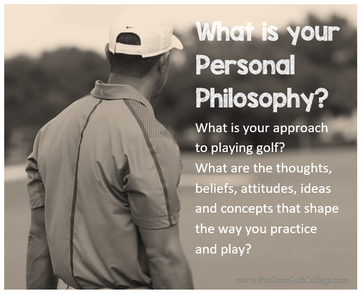 Your personal philosophy is a guiding principle or set of principles—much like your motto in life (you probably have more than one). Some even call it their personal mission statement, either way, when you are at the crossroads of your golfing life, to define the direction you wish to go in, developing your personal guiding philosophy will help. Steven Covey in his book 'First Things First' states that developing a personal mission statement is “connecting with your own unique purpose and the profound satisfaction that comes from fulfilling it.” If you are someone who enjoys posting certain types of quotes and memes on Facebook, Twitter or other social media platforms that you believe are useful, then you are paying attention to things that are supporting and influencing your personal guiding philosophy. Maybe one of your personal guiding philosophies is practicing hard for long hours, because you believe that doing this will accelerate your improvement. Or, you believe that talent is only helpful when you practice hard and often. How about this popular quote that many sport people use as part of their personal guiding philosophy; 'practice doesn't make perfect, perfect practice make perfect.' It will be helpful for you to formalize and adopt a set of guiding principles that helps you make progress with your golf, mostly on your terms and by the end of this article you will be able to do that. Jim Rohn's Personal Guiding Philosophy To help you gain clarity to define what your personal guiding philosophies are, following is the personal guiding philosophy of the late business and motivational speaker Jim Rohn. Source: http://www.success.com/article/rohn-7-tips-for-developing-your-personal-philosophy Jim Rohn’s personal guiding philosophy 'Do the few things that make the most difference, and spend most of your time doing them.' makes a lot of sense because it helped him to narrow his focus down to a few key principles that influence accelerated improvement. Do you know what your personal guiding philosophy is for continuous improvement in your golf? Is this even important to you, and have you ever thought about it this way? Could you write down a personal guiding philosophy like Jim Rohn's right now?... 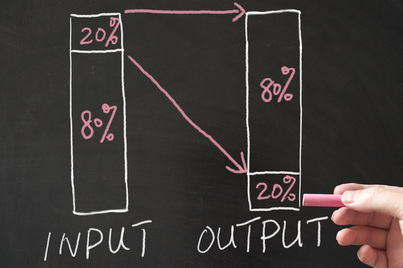 Source: http://www.thunderheadworks.com/80-20/ Source: http://www.thunderheadworks.com/80-20/ The Law of the Vital Few Jim Rohn's adopted personal guiding philosophy as taught to him by his mentor Mr Shoaff was built around a principle called the Law of the Vital Few. The Law of the Vital Few (also called the Pareto principle or 80/20 rule) states that for many events in your life, roughly 80 percent of the affects you produce or generate come from just 20 percent of the causes. https://en.m.wikipedia.org/wiki/Pareto_principle Now think about this principle for a moment and ask yourself if there are some skills in your golf game that carry a much higher scoring value than others. Are you practicing the wrong skills the right way, or, the right skills the wrong way? Can you think of 3 golf skills that when practiced with a deeper level of focus and commitment would guarantee a lower competitive score average? The Power of Putting Prowess How much is putting better worth to you? Well, let’s take a look at it. Let's say that your competitive score average for the past 20 rounds was a neat 75.0, and your total putting average for those 20 rounds was 30 putts. In this simple example fully 40% of your score average (75.0) would come from the way you use your putter on the greens. Now let’s take a look at some other skills. If you were to add up the shots played inside of 100 yards, you will see that green-side and your approach wedges account for another big chunk of your score average. In this example you can see that putting, bunker shots, chip and pitch shots, and approach wedge shots account for 45 of the 75 strokes (60%). Tee shots on par 4 and 5 holes, approach shots into the green from outside 100 yards on par 4 and 5 holes, and par 3 tee shots account for 30 of the 75 shots (40%). Now it might be that you need to focus more on the skills outside of 100 yards to lower your scores in tournaments, but either way you look at it, this is precisely why you need to define your personal guiding philosophy for practicing and improving your golf skills. You need to know specifically what you should practice more often to play better more often. Remember this; it is a small number of high pay-off skills that you practice deliberately and consistently that will influence lower scores more often on the golf course. Jim Rohn was smart to change his ways, and it was because he was at the crossroads in his life and looking to clean his slate, that the simple philosophy presented to him made so much sense. So he adopted it and began practicing it daily, and this day-to-day action built around a simple and timeless principle literally changed his life for the better. The 13 NLP Presuppositions One of my personal guiding philosophies that I adopted to help guide me as a professional coach is this one: The meaning of my communication is the response that I receive. This guiding philosophy presupposes that I take complete responsibility for how I communicate, and that if I share my message in a thoughtful and meaningful way to my student, then the feedback I receive should be that they understood the nature of the message, in which case they can make progress because they can access more of their potential to learn faster. Another of my favorites is this one: People work perfectly, they are not wrong or broken; it’s simply a matter of finding out how they function now, so they can effectively change how they function in that environment to something more useful or helpful. You are practicing and playing with the knowledge and resources you have available now, today--not yesterday, or tomorrow. If you are not playing the way the way you want, it doesn't mean that you are 'broken' or that you need 'fixing.' It's a simple matter of increasing the options you have available to you in the environment where you notice you are struggling, and adopting more useful and helpful strategies or models. And finally this one is my core coaching philosophy that all my philosophies fit inside of: The best way for me to get what I want out of my life is to help as many others get what they want out of their life. All people helpers can relate to this one and it doesn't need further explanation. Many of my personal guiding philosophies have been profoundly influenced and shaped by the 13 NLP (Neuro Linguistic Program) presuppositions. http://www.nlpco.com/2014/10/presuppositions-of-nlp These 13 NLP presuppositions (you presuppose that they are true for you) lead me to make better choices about where I wish to go, what I wish to do, the people I wish to work with and help, and the people I choose to associate with. They can do the same for you too. Are You Ready to Develop Yours? So what about you? Are you ready to develop your personal guiding philosophy now? If you are, then that’s great, and if you don’t know how to do, that's no problem because the following exercise will help you to define and create your own personal guiding philosophy. So, go ahead right now and complete the following exercise. Take your time and answer the following six questions without overthinking them. Using the attached PDF below you can print out and write your answers to the 6 questions. 1. When you get up each morning what is the most consistent thought you have about your golf? 2. What guides your actions and decisions—especially the impulsive ones when you are competing on the golf course? 3. What is it that gives you the strongest sense of satisfaction after you play a good round of golf? 4. What feelings or emotions are undeniable whenever you think about your golf game? 5. Why are your beliefs about achieving success in golf important to you? 6. How does your philosophy about how you practice and play golf measure up to your higher standards or ideals?
When You Are at the Crossroads, Your Personal Guiding Philosophy Will Help You
Thinking through the 6 questions has helped you to define and verbalize your guiding personal philosophy for golf. This process helps you decide which road to take, instead of just winging it (guessing), which many good golfers do without really knowing it. Now you will discover after completing this exercise that your personal philosophy really underpins 'the why' (your beliefs and values) of what you do when you practice, and greatly influences 'the what and how' (your behavior and capability) on the golf course when you compete. So now that you have completed this exercise, you will come to the understanding as to why you practiced and played the way you did, and more importantly, you will now know who to talk to to get the guidance to choose your right path when you are at the crossroads of your golfing life and need to make the right decision about which way you should go. We wish you the very best on your journey to a new golf game. Lawrie Montague and David Milne - Pro Tour Golf College The Professional Golf Tour Training College for Serious Amateur and Professional Golfers
Scott
19/11/2016 08:52:51 pm
Great article, thorough and insightful as usual. Keep up the good work as these articles promote many healthy discussions
Thanks so much Scott, we appreciate your feedback and that's where we want to positioned with much of what we publish, to think about other aspects of developing the golfer. Comments are closed.
|
Archives
June 2019
|
||||||
Proudly Supported By
Copyright © 2011 - 2018 Pro Tour Golf College
Website Managed By Golf Performance Media
All Rights Reserved
Website Managed By Golf Performance Media
All Rights Reserved

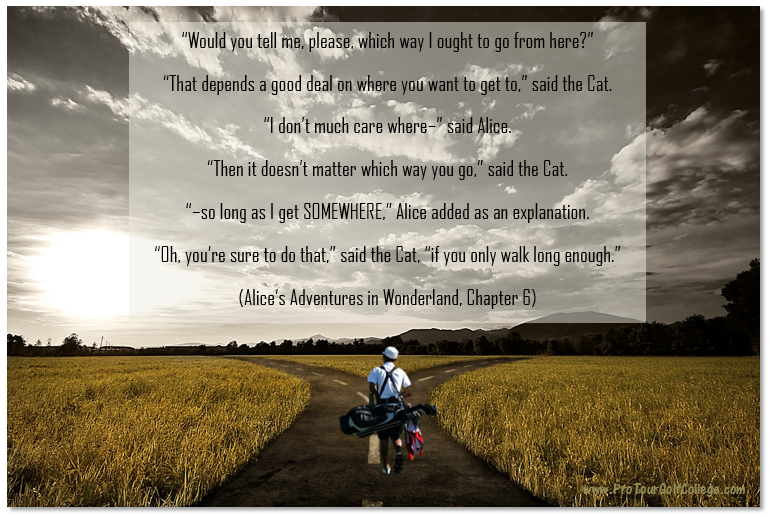
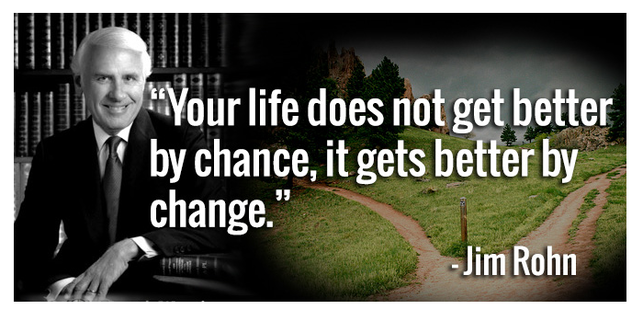

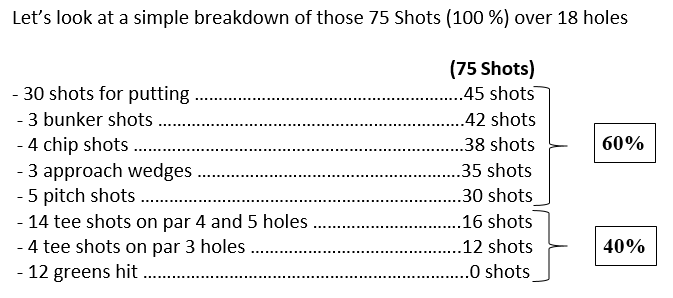

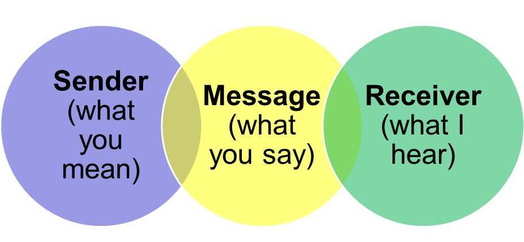

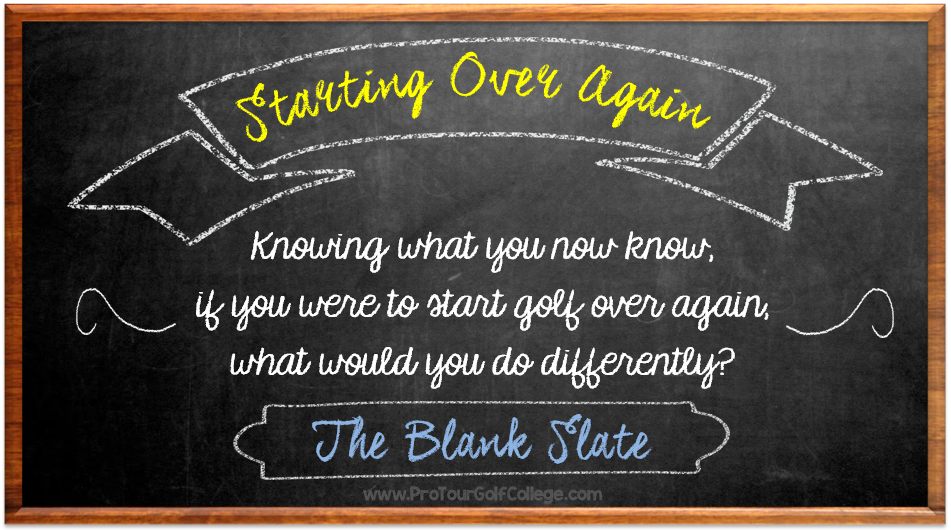
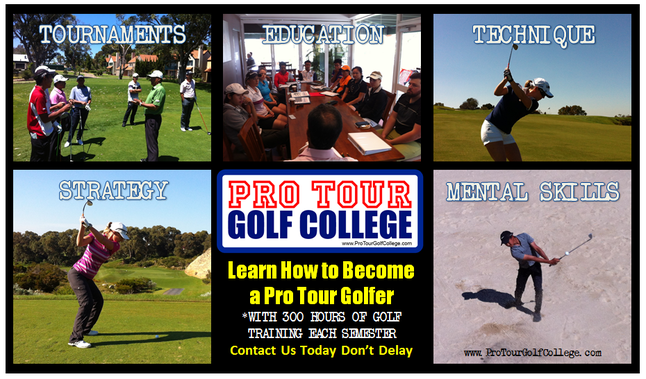
 RSS Feed
RSS Feed



